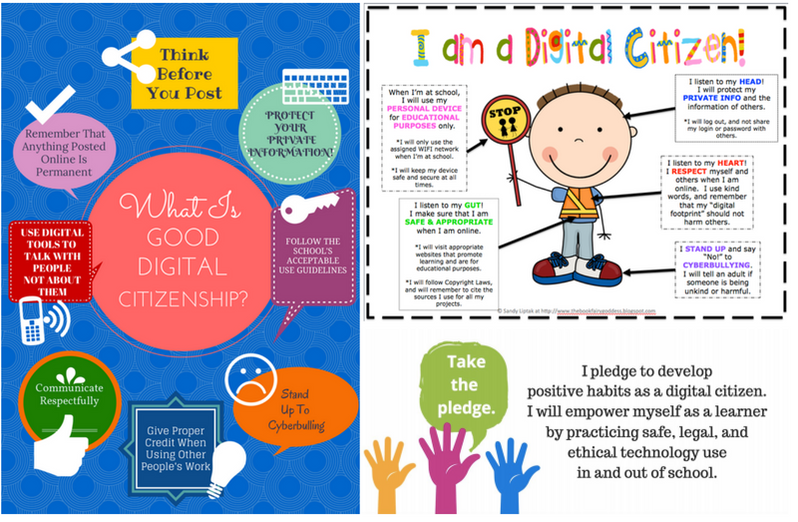Teaching digital citizenship equips students with the knowledge, skills, and resources to succeed as lifetime learners. This also helps them to engage within a digital environment with responsible and confidence to develop as leaders who will leave meaningful impacts in the lives of others. Integrating digital citizenship in our classroom is a vital part of our lives. Digital Citizenship refers to responsible technology usage and teaching digital citizenship is essential to helping students achieve and understand digital literacy, as well as ensuring cyberbullying prevention, online safety, digital responsibility, and digital health and wellness. New technology is being created daily, and online communication is becoming an increasingly common and important means of building and maintaining connections. Technology in education, job searching, and employment navigation, including meetings and conferences, are just a few of the countless ways technology usage and understanding will continue to be major tools of success for students.
#Teaching students Digital Citizenship…
Teaching Digital Citizenship can be boiled down to define, create, and execute. Defining the elements of digital citizenship and incorporating them into the curriculum, constructing a creative curriculum that highlights the themes we wish to teach. After that, execute digital citizenship principles by integrating them into existing teaching models and strategies. Effectively adding digital citizenship to a child’s education requires integration from the very beginning. To do this schools from elementary through high school need to cooperate with each other. Principals, staff, IT directors and admin, and boards need to work together. Teach Hub breaks down the curriculum by grade to help us find ways to reach students at each level.
There are several resources that can help teachers create their digital citizenship curriculum. Some of the best include:
- “Be Internet Awesome” by Google
- Microsoft Digital Literacy Curriculum
- Safe Online Surfing from the FBI
- Ignition, a Digital Literacy & Responsibility curriculum by Everfi
#Need for Digital Citizenship Education…
Our relationship with technology is one of the most defining aspects of our life. As I mentioned earlier, in India there is no particular teaching related to Digital Citizenship in schools, I can call it “Curriculum as Absent”. However, before teaching our children and incorporating it in the curriculum, Educators and Parents must keep themselves updated with the safety features of social media platforms, the aim should be to create a space for students to reflect on their own behaviors, and school education boards should prescribe digital citizenship curriculum that schools can follow not just for teenagers but even for younger students. Without any doubt, there is a rise of digital citizens as the government has been investing in technology and processes to upgrade and standardize the disparate processes in the traditional citizen services model. Still teaching important elements of digital citizenship to our students is imperative. Using Digital Citizenship Lesson Plans to address timely topics and prepare students to take ownership of their digital lives.

Common sense Education are providing imperative and great lesson plans for the educators as well as parents. They are intentionally designed to cultivate both skills and dispositions to help young people thrive in our interconnected world. https://www.commonsense.org/education/digital-citizenship/lesson/digital-trails.
As I am not much into the teaching of digital citizenship in schools and still learning a lot about it, I want to know more about the strategies and methods used by teachers to integrate Digital Citizenship in our classrooms.
I personally like the approach of explicitly teaching digital citizenship in my Grade 6 classroom. We talk about different things such as making good passwords, online conduct, where to find help, as well as I, share personal experiences with them from my teaching and personal life. Keeping an open dialogue is imperative for students to feel comfortable and able to open up to teachers. I think it depends on one’s comfort zone, and where your kiddos are at. If you have a pretty immature group, then talking about things like online exploitation may not be appropriate, and maybe writing emails, making passwords, and deciding what sites are trustworthy may be a better route. I also think that it really depends on the age group, and what levels the kiddos are at.
I like your thoughts and methods of teaching Digital citizenship to students and I agree our methods and strategies totally depend upon the group of students we are teaching. Thanks for sharing!
Thanks for sharing those resources, Gunpreesh! I can definitely incorporate them into my final project. I think Kelly has given some really good advice, in terms of teaching strategies appropriate for digital citizenship. I think it is really important to get a baseline of your students. You need to know what they know and how much they are familiar with. I like to get a sense of rules/expectations students have at home. Not that we can or should try to control that, but it helps with the overall understanding. Once you have your baseline, I think you can use that information to guide your next steps.
I believe in your point, Jill. It’s important to have pre-knowledge about students’ learning before taking something new with our approach to teaching.
I am totally agree with you, schools should have to create a curriculum which provides knowledge about digital citizenship to there teachers & students, so that they better learn how to use digital media, digital sites in a wise way. moreover, with the help of this type of curriculum, a teacher can explain all the ethical, moral and legal issues of internet & social networking sites to there students.
I also believe that there is a need of creating proper space for digital literacy in the curriculum. Without this space, I think most of the educators will consider it as… just another topic to cover… but this world demands proper guidance. This can be done by teaching teachers/guardians/parents about it and motivating them to inculcate this knowledge in their kids.
Thank you for sharing these amazing resources!